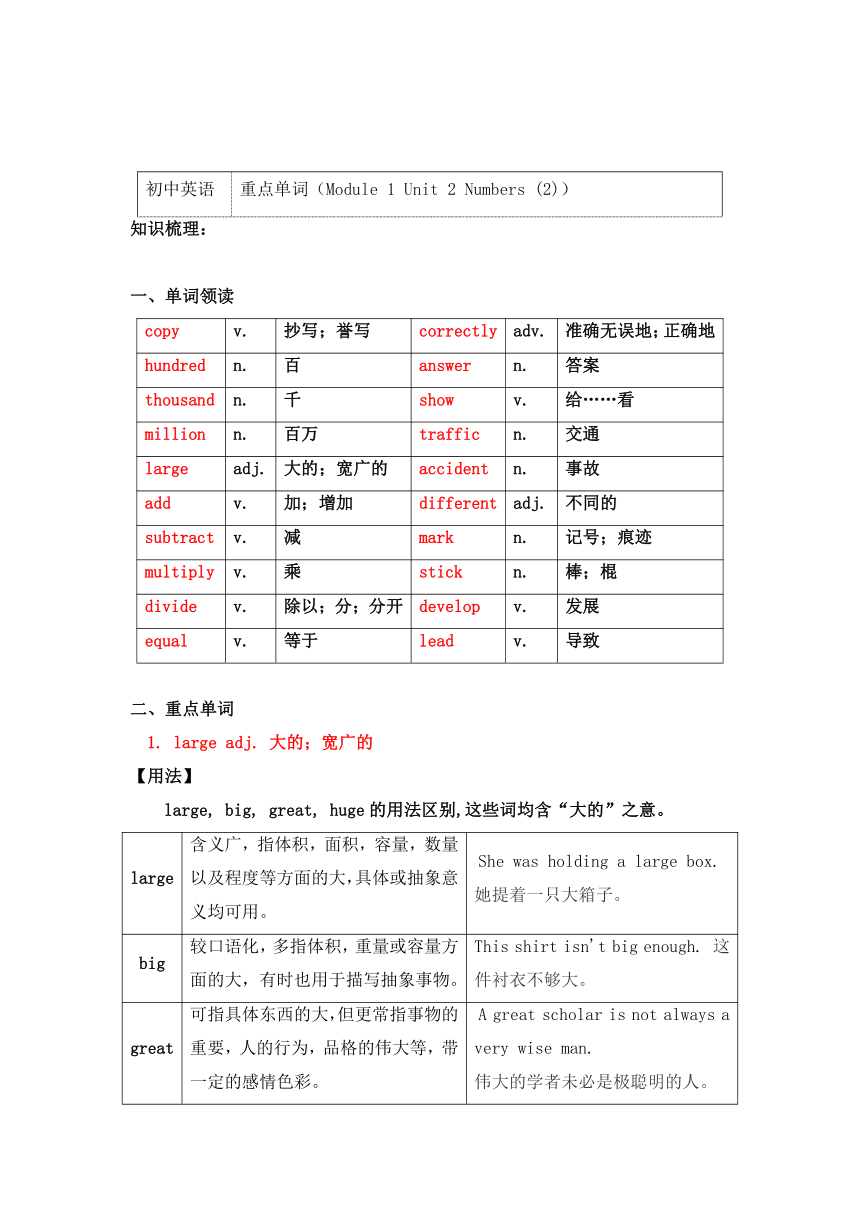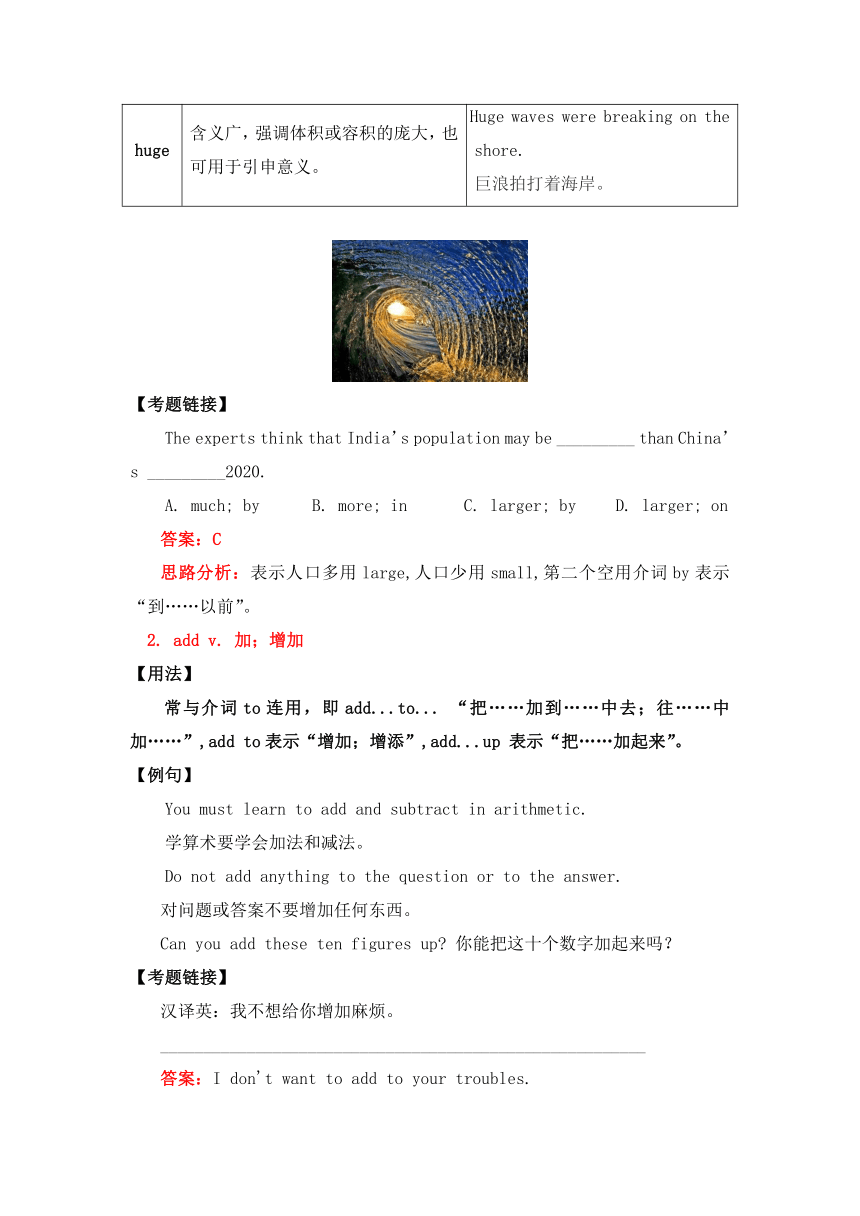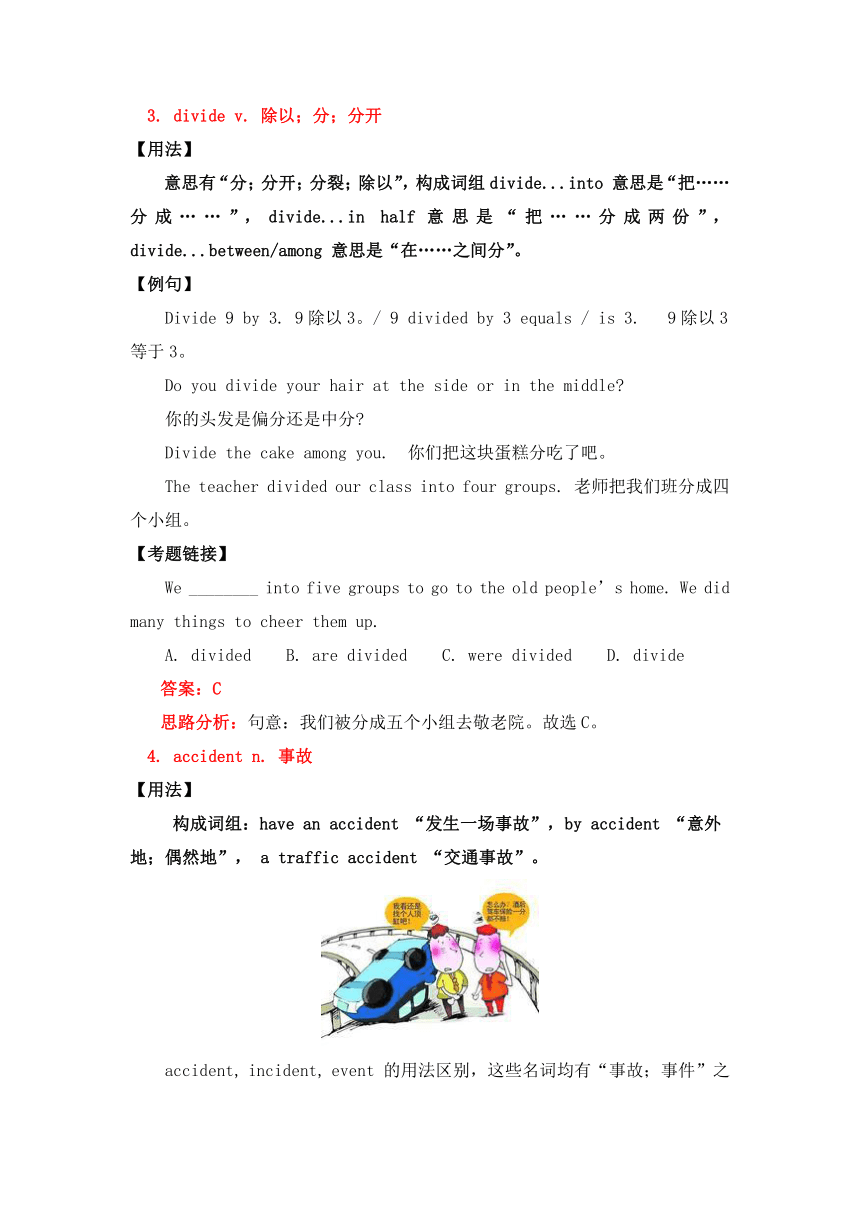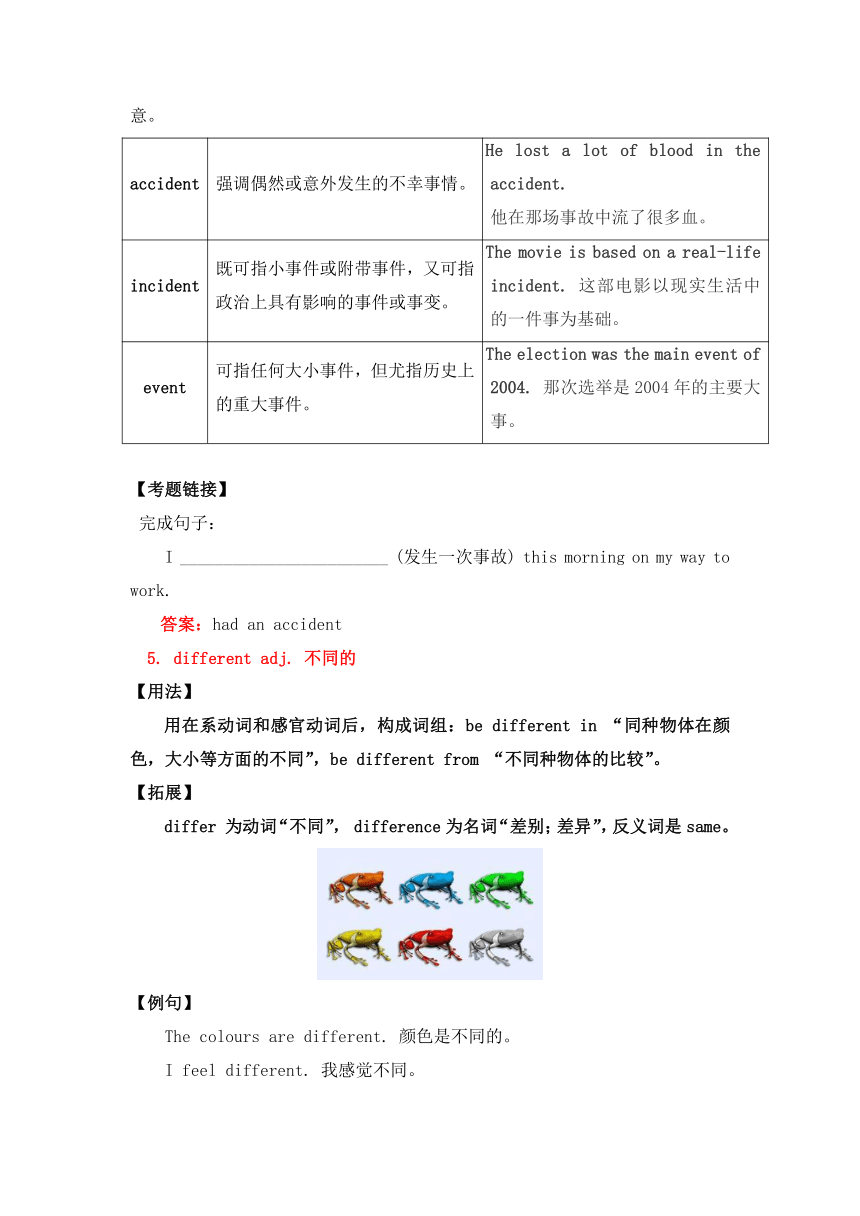牛津深圳版英语八年级上册 Module 1 Amazing things Unit 2 Numbers (2) 重点单词知识讲义(含答案)
文档属性
| 名称 | 牛津深圳版英语八年级上册 Module 1 Amazing things Unit 2 Numbers (2) 重点单词知识讲义(含答案) |

|
|
| 格式 | doc | ||
| 文件大小 | 128.0KB | ||
| 资源类型 | 教案 | ||
| 版本资源 | 牛津深圳版 | ||
| 科目 | 英语 | ||
| 更新时间 | 2020-09-17 13:20:40 | ||
图片预览




文档简介
初中英语 重点单词(Module 1 Unit 2 Numbers (2))
知识梳理:
一、单词领读
copy v. 抄写;誉写 correctly adv. 准确无误地;正确地
hundred n. 百 answer n. 答案
thousand n. 千 show v. 给……看
million n. 百万 traffic n. 交通
large adj. 大的;宽广的 accident n. 事故
add v. 加;增加 different adj. 不同的
subtract v. 减 mark n. 记号;痕迹
multiply v. 乘 stick n. 棒;棍
divide v. 除以;分;分开 develop v. 发展
equal v. 等于 lead v. 导致
二、重点单词
1. large adj. 大的;宽广的
【用法】
large, big, great, huge的用法区别,这些词均含“大的”之意。
large 含义广,指体积,面积,容量,数量以及程度等方面的大,具体或抽象意义均可用。 She was holding a large box.
她提着一只大箱子。
big 较口语化,多指体积,重量或容量方面的大,有时也用于描写抽象事物。 This shirt isn't big enough. 这件衬衣不够大。
great 可指具体东西的大,但更常指事物的重要,人的行为,品格的伟大等,带一定的感彩。 A great scholar is not always a very wise man.
伟大的学者未必是极聪明的人。
huge 含义广,强调体积或容积的庞大,也可用于引申意义。 Huge waves were breaking on the shore.
巨浪拍打着海岸。
【考题链接】
The experts think that India’s population may be _________ than China’s _________2020.
A. much; by B. more; in C. larger; by D. larger; on
答案:C
思路分析:表示人口多用large,人口少用small,第二个空用介词by表示“到……以前”。
2. add v. 加;增加
【用法】
常与介词to连用,即add...to... “把……加到……中去;往……中加……”,add to表示“增加;增添”,add...up 表示“把……加起来”。
【例句】
You must learn to add and subtract in arithmetic.
学算术要学会加法和减法。
Do not add anything to the question or to the answer.
对问题或答案不要增加任何东西。
Can you add these ten figures up? 你能把这十个数字加起来吗?
【考题链接】
汉译英:我不想给你增加麻烦。
________________________________________________________
答案:I don't want to add to your troubles.
3. divide v. 除以;分;分开
【用法】
意思有“分;分开;分裂;除以”,构成词组divide...into 意思是“把……分成……”,divide...in half意思是“把……分成两份”,divide...between/among 意思是“在……之间分”。
【例句】
Divide 9 by 3. 9除以3。/ 9 divided by 3 equals / is 3. 9除以3等于3。
Do you divide your hair at the side or in the middle?
你的头发是偏分还是中分?
Divide the cake among you. 你们把这块蛋糕分吃了吧。
The teacher divided our class into four groups. 老师把我们班分成四个小组。
【考题链接】
We ________ into five groups to go to the old people’s home. We did many things to cheer them up.
A. divided B. are divided C. were divided D. divide
答案:C
思路分析:句意:我们被分成五个小组去敬老院。故选C。
4. accident n. 事故
【用法】
构成词组:have an accident “发生一场事故”,by accident “意外地;偶然地”, a traffic accident “交通事故”。
accident, incident, event 的用法区别,这些名词均有“事故;事件”之意。
accident 强调偶然或意外发生的不幸事情。 He lost a lot of blood in the accident.
他在那场事故中流了很多血。
incident 既可指小事件或附带事件,又可指政治上具有影响的事件或事变。 The movie is based on a real-life incident. 这部电影以现实生活中的一件事为基础。
event 可指任何大小事件,但尤指历史上的重大事件。 The election was the main event of 2004. 那次选举是2004年的主要大事。
【考题链接】
完成句子:
I ________________________ (发生一次事故) this morning on my way to work.
答案:had an accident
5. different adj. 不同的
【用法】
用在系动词和感官动词后,构成词组:be different in “同种物体在颜色,大小等方面的不同”,be different from “不同种物体的比较”。
【拓展】
differ 为动词“不同”, difference为名词“差别;差异”,反义词是same。
【例句】
The colours are different. 颜色是不同的。
I feel different. 我感觉不同。
The cups are different in colour and shape. 这些杯子在颜色和形状方面都不同。
Fish is different from whales. 鱼和鲸是不同的。
【考题链接】
Tom wanted to find a good job in the city, but he found things were ________ when he got there.
A. comfortable B. different C. easy D. pleasant
答案:B
思路分析:由转折连词 “but” 可知,“事情与想象的不一样”,故选B。
【即学即练】
用框里所给单词的正确形式填空。
different, accident, large, add, divide
1. The children are already learning to multiply and ________.
2. The ________ is so slight that I can hardly see it.
3. He was killed in a traffic __________ at the age of 24.
4. If the tea is too strong, ___________ some hot water.
5. I could really want a ________ glass of beer.
答案:1. divide 2. difference 3. accident 4. add 5. large
同步练习:
(答题时间:15分钟)
I. 用所给单词的正确形式填空。
1. 9 ________ (divide) by 3 equals 3.
2. People used many ________ (difference) ways to count things.
3. They used them ________ (count) things like the days of the month.
4. This ________ (lead) to the Hindu-Arabic system.
5. We are still ________ (use) this system today.
II. 选择并抄写单词
1. American English is ________(difference; different) from British English.
2. Tian’anmen Square is one of the________(large; largest) squares in the world.
3. My grandpa had ________(a; an) traffic accident yesterday.
4. 16________(divided; divide) by 4 is 4.
5. Mr. Chen was surprised to see the fast ________ (develop; development) in Shanghai.
III. 阅读理解
Hundreds of years ago there lived a king in a small country. He liked swimming. When summer came, he always went to another palace by a forest with his guards and returned to the capital in autumn.
One afternoon the king went swimming in a river in the forest but he didn’t tell others about it. He was very happy when he swam in the water. After that he heard a great noise and saw a big bear coming at him. He tried his best to run away. He ran and ran and at last he lost his way. He was hungry and tired when he found an old house. There was an old farmer in it. “It’s your king,” he said to the old man. “I’m hungry now. Bring me something to eat quickly!”
The old man had nothing dear. He only had four eggs. The king ate them and felt better. “How much must I pay you for that?”
“Eighteen pounds.”
“How dear they are! Are eggs rare(稀有的)here?”
“No,” answered the old farmer. “we have only one king in our country!”
( ) 1. _________,he was happy.
A. The river was beautiful B. He was swimming in the water
C. The water was warm D. The king could swim for a long time
( ) 2. When the king saw the bear, he _________.
A. asked the old farmer to help him B. cried for help
C. ran away quickly D. ran outside the forest
( ) 3. At last the king found _________.
A. an old house B. his guards C. his capital D. the bear
( ) 4. The king felt better because _________.
A. he could sleep in the farmer’s house B. the bear couldn’t find him
C. he ate four eggs D. the farmer knew he was a king
( ) 5. Which is the best title of the story?
A. The King and the Old Farmer B. The King in the Forest
C. The King and the Bear D. The Kind hearted King
答案:
I. 1. divided 2. different 3. to count 4. led 5. using
II. 1. different 2. largest 3. a 4. divided 5. development
III. 1—5 BCACA
知识梳理:
一、单词领读
copy v. 抄写;誉写 correctly adv. 准确无误地;正确地
hundred n. 百 answer n. 答案
thousand n. 千 show v. 给……看
million n. 百万 traffic n. 交通
large adj. 大的;宽广的 accident n. 事故
add v. 加;增加 different adj. 不同的
subtract v. 减 mark n. 记号;痕迹
multiply v. 乘 stick n. 棒;棍
divide v. 除以;分;分开 develop v. 发展
equal v. 等于 lead v. 导致
二、重点单词
1. large adj. 大的;宽广的
【用法】
large, big, great, huge的用法区别,这些词均含“大的”之意。
large 含义广,指体积,面积,容量,数量以及程度等方面的大,具体或抽象意义均可用。 She was holding a large box.
她提着一只大箱子。
big 较口语化,多指体积,重量或容量方面的大,有时也用于描写抽象事物。 This shirt isn't big enough. 这件衬衣不够大。
great 可指具体东西的大,但更常指事物的重要,人的行为,品格的伟大等,带一定的感彩。 A great scholar is not always a very wise man.
伟大的学者未必是极聪明的人。
huge 含义广,强调体积或容积的庞大,也可用于引申意义。 Huge waves were breaking on the shore.
巨浪拍打着海岸。
【考题链接】
The experts think that India’s population may be _________ than China’s _________2020.
A. much; by B. more; in C. larger; by D. larger; on
答案:C
思路分析:表示人口多用large,人口少用small,第二个空用介词by表示“到……以前”。
2. add v. 加;增加
【用法】
常与介词to连用,即add...to... “把……加到……中去;往……中加……”,add to表示“增加;增添”,add...up 表示“把……加起来”。
【例句】
You must learn to add and subtract in arithmetic.
学算术要学会加法和减法。
Do not add anything to the question or to the answer.
对问题或答案不要增加任何东西。
Can you add these ten figures up? 你能把这十个数字加起来吗?
【考题链接】
汉译英:我不想给你增加麻烦。
________________________________________________________
答案:I don't want to add to your troubles.
3. divide v. 除以;分;分开
【用法】
意思有“分;分开;分裂;除以”,构成词组divide...into 意思是“把……分成……”,divide...in half意思是“把……分成两份”,divide...between/among 意思是“在……之间分”。
【例句】
Divide 9 by 3. 9除以3。/ 9 divided by 3 equals / is 3. 9除以3等于3。
Do you divide your hair at the side or in the middle?
你的头发是偏分还是中分?
Divide the cake among you. 你们把这块蛋糕分吃了吧。
The teacher divided our class into four groups. 老师把我们班分成四个小组。
【考题链接】
We ________ into five groups to go to the old people’s home. We did many things to cheer them up.
A. divided B. are divided C. were divided D. divide
答案:C
思路分析:句意:我们被分成五个小组去敬老院。故选C。
4. accident n. 事故
【用法】
构成词组:have an accident “发生一场事故”,by accident “意外地;偶然地”, a traffic accident “交通事故”。
accident, incident, event 的用法区别,这些名词均有“事故;事件”之意。
accident 强调偶然或意外发生的不幸事情。 He lost a lot of blood in the accident.
他在那场事故中流了很多血。
incident 既可指小事件或附带事件,又可指政治上具有影响的事件或事变。 The movie is based on a real-life incident. 这部电影以现实生活中的一件事为基础。
event 可指任何大小事件,但尤指历史上的重大事件。 The election was the main event of 2004. 那次选举是2004年的主要大事。
【考题链接】
完成句子:
I ________________________ (发生一次事故) this morning on my way to work.
答案:had an accident
5. different adj. 不同的
【用法】
用在系动词和感官动词后,构成词组:be different in “同种物体在颜色,大小等方面的不同”,be different from “不同种物体的比较”。
【拓展】
differ 为动词“不同”, difference为名词“差别;差异”,反义词是same。
【例句】
The colours are different. 颜色是不同的。
I feel different. 我感觉不同。
The cups are different in colour and shape. 这些杯子在颜色和形状方面都不同。
Fish is different from whales. 鱼和鲸是不同的。
【考题链接】
Tom wanted to find a good job in the city, but he found things were ________ when he got there.
A. comfortable B. different C. easy D. pleasant
答案:B
思路分析:由转折连词 “but” 可知,“事情与想象的不一样”,故选B。
【即学即练】
用框里所给单词的正确形式填空。
different, accident, large, add, divide
1. The children are already learning to multiply and ________.
2. The ________ is so slight that I can hardly see it.
3. He was killed in a traffic __________ at the age of 24.
4. If the tea is too strong, ___________ some hot water.
5. I could really want a ________ glass of beer.
答案:1. divide 2. difference 3. accident 4. add 5. large
同步练习:
(答题时间:15分钟)
I. 用所给单词的正确形式填空。
1. 9 ________ (divide) by 3 equals 3.
2. People used many ________ (difference) ways to count things.
3. They used them ________ (count) things like the days of the month.
4. This ________ (lead) to the Hindu-Arabic system.
5. We are still ________ (use) this system today.
II. 选择并抄写单词
1. American English is ________(difference; different) from British English.
2. Tian’anmen Square is one of the________(large; largest) squares in the world.
3. My grandpa had ________(a; an) traffic accident yesterday.
4. 16________(divided; divide) by 4 is 4.
5. Mr. Chen was surprised to see the fast ________ (develop; development) in Shanghai.
III. 阅读理解
Hundreds of years ago there lived a king in a small country. He liked swimming. When summer came, he always went to another palace by a forest with his guards and returned to the capital in autumn.
One afternoon the king went swimming in a river in the forest but he didn’t tell others about it. He was very happy when he swam in the water. After that he heard a great noise and saw a big bear coming at him. He tried his best to run away. He ran and ran and at last he lost his way. He was hungry and tired when he found an old house. There was an old farmer in it. “It’s your king,” he said to the old man. “I’m hungry now. Bring me something to eat quickly!”
The old man had nothing dear. He only had four eggs. The king ate them and felt better. “How much must I pay you for that?”
“Eighteen pounds.”
“How dear they are! Are eggs rare(稀有的)here?”
“No,” answered the old farmer. “we have only one king in our country!”
( ) 1. _________,he was happy.
A. The river was beautiful B. He was swimming in the water
C. The water was warm D. The king could swim for a long time
( ) 2. When the king saw the bear, he _________.
A. asked the old farmer to help him B. cried for help
C. ran away quickly D. ran outside the forest
( ) 3. At last the king found _________.
A. an old house B. his guards C. his capital D. the bear
( ) 4. The king felt better because _________.
A. he could sleep in the farmer’s house B. the bear couldn’t find him
C. he ate four eggs D. the farmer knew he was a king
( ) 5. Which is the best title of the story?
A. The King and the Old Farmer B. The King in the Forest
C. The King and the Bear D. The Kind hearted King
答案:
I. 1. divided 2. different 3. to count 4. led 5. using
II. 1. different 2. largest 3. a 4. divided 5. development
III. 1—5 BCACA
